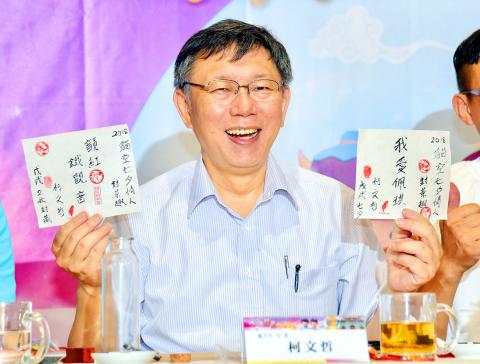Taipei Mayor Ko Wen-je (柯文哲) yesterday said that his discourse on cross-strait relations has always been clear and his statement that “the two sides of the [Taiwan] Strait are one family” remains his fundamental stance.
Wu Tsu-chia (吳子嘉), a commentator who runs news Web site my-formosa.com, on Saturday said that Ko’s discourse on cross-strait relations has been vacillating and lacks a “fundamental spirit.”
When asked by reporters to comment on Wu’s remarks, Ko said: “My attitude toward cross-strait relations is very certain.”

Photo: Huang Yao-cheng, Taipei Times
Many have criticized him for meeting with politicians from different camps, and he used to wonder why, but he has now reached an answer, Ko said.
“I worked at intensive care units and emergency rooms as a doctor, and doctors have a trait: We never get to choose our patients,” Ko said. “We cannot ask patients to come in only if they are affiliated with the Chinese Nationalist Party [KMT] or Democratic Progressive Party.”
He has no difficulty speaking with politicians from the pan-blue or the pan-green camps, Ko said, adding that having “practical dialogues” is his specialty, because his experience as a surgeon has made him practical and willing to listen to different opinions.
“The statement that ‘the two sides of the [Taiwan] Strait are one family’ is still a fundamental element [of my cross-strait discourse] for the time being. It does not pertain to politics, but rather to cultural and economic exchanges, as well as exchanges between private actors and between cities,” he said.
“The nation’s future cannot rely on others’ friendliness toward us, so economic capability and national defense must be bolstered while expressing our friendliness,” Ko said.
“I do not advocate the two sides of the Strait talking tough to each other and causing relations to become more tense, which is what we see now and I do not think that is a good situation,” he added.
Separately yesterday, Ko presented two new spokespeople for his campaign office for the Nov. 24 nine-in-one local elections.
Tsai Chun-wei (蔡峻維) and Yang Sheng (楊笙) are both in their 20s and were chosen through an open audition, Ko said.
Tsai and Yang are to first work as interns alongside office spokesman Lin Hsiao-chi (林筱淇) and Taipei Mayoral Office spokesman Lin Kun-feng (林昆鋒), who is to leave his post and join the campaign team as head spokesman next month, the office said.

A preclearance service to facilitate entry for people traveling to select airports in Japan would be available from Thursday next week to Feb. 25 at Taiwan Taoyuan International Airport, Taoyuan International Airport Corp (TIAC) said on Tuesday. The service was first made available to Taiwanese travelers throughout the winter vacation of 2024 and during the Lunar New Year holiday. In addition to flights to the Japanese cities of Hakodate, Asahikawa, Akita, Sendai, Niigata, Okayama, Takamatsu, Kumamoto and Kagoshima, the service would be available to travelers to Kobe and Oita. The service can be accessed by passengers of 15 flight routes operated by

Chinese spouse and influencer Guan Guan’s (關關) residency permit has been revoked for repeatedly posting pro-China videos that threaten national security, the National Immigration Agency confirmed today. Guan Guan has said many controversial statements in her videos posted to Douyin (抖音), including “the red flag will soon be painted all over Taiwan” and “Taiwan is an inseparable part of China,” and expressing hope for expedited reunification. The agency last year received multiple reports alleging that Guan Guan had advocated for armed reunification. After verifying the reports, the agency last month issued a notice requiring her to appear and explain her actions. Guan

GIVE AND TAKE: Blood demand continues to rise each year, while fewer young donors are available due to the nation’s falling birthrate, a doctor said Blood donors can redeem points earned from donations to obtain limited edition Formosan black bear travel mugs, the Kaohsiung Blood Center said yesterday, as it announced a goal of stocking 20,000 units of blood prior to the Lunar New Year. The last month of the lunar year is National Blood Donation Month, when local centers seek to stockpile blood for use during the Lunar New Year holiday. The blood demand in southern Taiwan — including Tainan and Kaohsiung, as well as Chiayi, Pingtung, Penghu and Taitung counties — is about 2,000 units per day, the center said. The donation campaign aims to boost

The Central Weather Administration (CWA) said a magnitude 4.9 earthquake that struck off the coast of eastern Taiwan yesterday was an independent event and part of a stress-adjustment process. The earthquake occurred at 4:47pm, with its epicenter at sea about 45.4km south of Yilan County Hall at a depth of 5.9km, the CWA said. The quake's intensity, which gauges the actual effects of a temblor, was highest in several townships in Yilan and neighboring Hualien County, where it measured 4 on Taiwan's seven-tier intensity scale, the CWA said. Lin Po-yu (林柏佑), a division chief at the CWA's Seismological Center, told a news conference